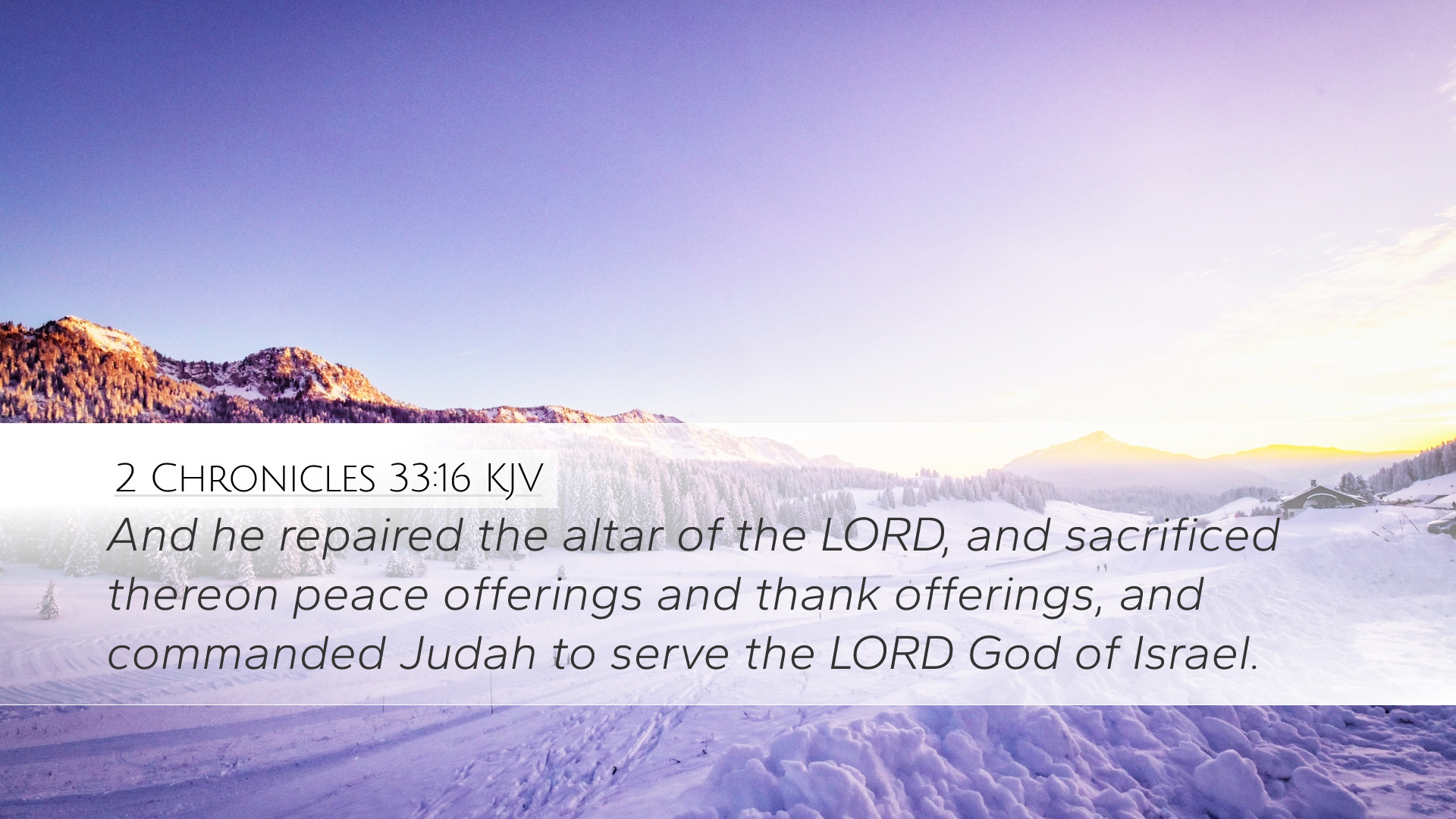Commentary on 2 Chronicles 33:16
Verse: "And he restored the altar of the LORD, and sacrificed thereon peace offerings and thank offerings, and commanded Judah to serve the LORD God of Israel."
Introduction
The verse of 2 Chronicles 33:16 stands as a pivotal moment in the reign of King Manasseh of Judah, illustrating profound themes of repentance, restoration, and divine grace. This commentary synthesizes insights from public domain sources such as Matthew Henry, Albert Barnes, and Adam Clarke, providing a comprehensive understanding of this passage's theological and historical implications.
The Context of Manasseh's Reign
Before delving into the specifics of 2 Chronicles 33:16, it is essential to contextualize Manasseh’s reign. He ascended to the throne at a tender age and ruled for 55 years, a notably long tenure. However, this reign is marked by grave disobedience and idolatry, as noted by both Henry and Barnes. Manasseh led Judah into sin, practicing the abominable customs of surrounding nations, including idol worship, which provoked God's anger.
Manasseh's Repentance
The narrative surrounding Manasseh's repentance is fundamental to understanding this verse. According to Henry, after suffering captivity in Babylon, Manasseh humbled himself and sought the Lord's favor. This transition is crucial as it indicates that no one is beyond the reach of God's mercy, illustrating the theme of redemption.
Divine Forgiveness
Clarke emphasizes the importance of true repentance in Manasseh's return. The king's sincere humility is met with divine compassion, underscoring the biblical principle that God will receive those who turn to Him with a contrite heart. Manasseh's journey from sin to restoration serves as a reminder of the transformative power of grace.
Restoration of the Altar
Verse 33:16 highlights a significant act of Manasseh: the restoration of the altar of the LORD. This action symbolizes a return to true worship and the reinstatement of right practices in Judah. According to Barnes, this restoration is emblematic of the need for communion with God, a theme echoed throughout scripture.
The Significance of Sacrifices
Manasseh’s offerings of peace and thank offerings hold particular importance. Matthew Henry notes that these sacrifices were not mere rituals; they expressed gratitude and reconciliation with God. Peace offerings, in particular, signify restored relationship and divine favor—a clear recognition of God’s grace in spite of past failures.
Command to Serve the LORD
The verse concludes with Manasseh commanding Judah to serve the LORD God of Israel. This directive reflects his desire for national revival and commitment to covenant faithfulness. Clarke posits that this command serves multiple purposes: a public declaration of faith, a call to collective worship, and an effort to guide the people away from idolatry back to the worship of the true God.
Leadership and Influence
The role of leadership in spiritual matters cannot be overstated. As noted by Barnes, the king's actions set the tone for the nation. Leaders bear the responsibility of guiding their communities in faith, and Manasseh’s newfound devotion exemplifies how personal change can spur broader spiritual renewal.
Theological Implications
This passage prompts reflection on several theological themes:
- The Nature of God’s Mercy: God’s willingness to forgive Manasseh illustrates His infinite mercy. No sin is too great for repentance to restore a relationship with God.
- Repentance as a Turning Point: Manasseh's humbling before God is a powerful testament to the importance of sincere repentance in the believer’s life.
- The Role of Worship: The restoration of the altar signifies the centrality of worship in the life of a believer and a community, reinforcing the notion that worship is both a personal and collective obligation.
- Leadership Responsibility: The impact of a leader’s faith on a community emphasizes the responsibility that spiritual leaders have in guiding their congregations toward righteousness.
Conclusion
2 Chronicles 33:16 provides rich insights into the nature of repentance, restoration, and leadership in spiritual matters. The narrative of Manasseh serves as a powerful reminder of the potential for change, the importance of humility, and the graciousness of God. For pastors, students, theologians, and scholars, this verse encapsulates core themes of Judeo-Christian theology, encouraging ongoing reflection on the depth of God’s mercy and the call to authentic worship.


